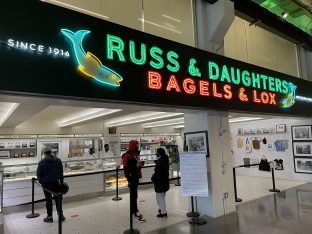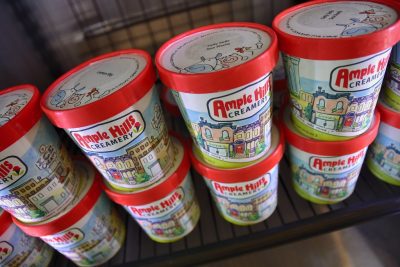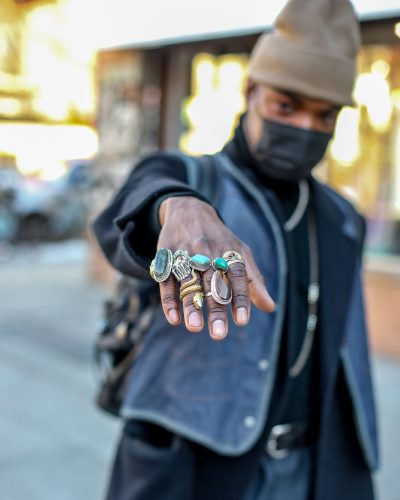How Russ & Daughters got back to their Brooklyn roots
'It’s hard to believe how much we’ve come full circle.'
The name Russ & Daughters is likely to conjure images of solemn East Houston Street fish sophisticates, lining reverently up for babka and herring, matzo ball soup and pastrami lox in a tiny, immaculate jewel-box storefront.
But on a recent Friday, the fourth generation owner of legendary lox and bagel purveyor Russ & Daughters, is walking the hallways of Russ & Daughters Brooklyn, her cavernous new headquarters in the Brooklyn Navy Yard. The rich smell of frying potato latkes seeps through the face masks as she passes the prep kitchen and in-house bakery.
“Brooklyn is where my family’s story started and now coming back to Brooklyn is what saved our family business 113 years later,” says Niki Russ Federman. “It’s hard to believe how much we’ve come full circle, just two blocks from Myrtle Avenue, where my great-grandfather Joel Russ arrived as a 20-year-old immigrant from Poland in 1907.”
Joel quickly got to work selling schmaltz herring on the streets of the Lower East Side, first from a barrel, then a pushcart, a horse and wagon and then, in 1914, he opened his shop which he would boldly later rename “Russ & Daughters” in 1935.
A 100-year-old startup
Back here in Brooklyn, the workforce is a microcosm: a tattooed hipster slices bialys next to a young woman in a hijab, surrounded by the usual diverse group of people of Hispanic, African American and Caribbean heritage that you would expect to find backstage in a great New York culinary institution. Strangely enough, the startup hub setting of the Brooklyn Navy Yard does not at all feel out of place for a century-old family business that grew out of the bygone Lower East Side melting pot.

Building 77 (Photo by Jann Martin Schwarz)
Building 77 in the Brooklyn Navy Yard has history, too. It was built like a warehouse fortress in the early 1940s to store and load tanks, ammunition and other supplies onto Navy battleships in WWII. In a stroke of luck, Russ & Daughters built out their “Appetizing Factory,” as they call it, with a long-term vision for a bigger ecommerce business, its own bakery, a double-height event space, and a retail counter to take care of the growing number of Brooklyn-based customers. They moved here in late 2018. At the time, there was a lot of agonizing over the riskiness of a $3 million investment. It has turned out to be a saving grace.
“The build-out was the biggest risk we took since I joined the business. We hoped it would show its value in 10, 20 years from now, but it ended up saving us during the pandemic” says Russ Federman, 43. “It accelerated the move to a more diversified business, with more space and better operations. If we were just still a small store and restaurant with a cramped back-of-house, I am not sure we would have survived.”
Russ & Daughters Cafe is doing delivery and pick-up only, the uptown Jewish Museum outpost remains closed, and the tiny pristine original LES store lets in only three people at a time. But Russ & Daughters Brooklyn has quadrupled its e-commerce business within the last year (they declined to say from what base). From the spacious and pandemic-proof Navy Yard location, they are now shipping out hundreds of mail-order packages a day, with the average order for salmon, bagels, babka or caviar. Within the city limits they have also started a very popular champagne and caviar delivery service enabled by the relaxed liquor laws.
From Zero to hero
Russ and Daughters’ survival seems vital to a city known around the world for its lox and bagel tradition, a symbol of continuity during a brutal time for small businesses. Russ & Daughters is a cherished institution, with a fanbase as passionate and diverse as the city itself, starting with little old Jewish ladies and borscht belt grandees like Zero Mostel and expanding to Martha Stewart, Jake Gyllenhaal and even to the late downtown rock legend Lou Reed, whose private memorial service was catered by R&D. For a century it survived as the beloved last archetype of the once ubiquitous Lower East Side fish-centric “appetizing” store, down the street from the more touristy and meat-focused Katz’s Delicatessen.
Over the past decade or so, under the leadership of Russ Federman and her cousin Josh Russ Tupper, Russ & Daughters became gradually and then suddenly very cool. They opened two restaurants, including the highly acclaimed flagship Russ & Daughters Cafe on Orchard Street. They even had a PBS documentary called The Sturgeon Queens made about them by Julie Cohen, the same filmmaker who went on to make “RBG” about the late Supreme Court Justice, R&D loyalist and fellow Brooklynite Ruth Bader Ginsburg.
“What makes Niki and her team unique is that they made no excuses for being 100-plus years old. Rather than trash their heritage, as so many older brands do, they leaned into it,” says New York advertising legend David Sable, himself a big fan. “You have 90-year old customers whose parents shopped here standing in line with young first timers in between people of all ages and ethnicities who appreciate nothing but the best.”
A mother of two young kids and lifelong Park Slope resident (save for stints in San Francisco and New Haven in her 20s), Niki Russ Federman is a warm and low-key host and subtle storyteller. She’s also a secret master networker who knows everyone and seems born for her role as NYC culinary ambassador. That wasn’t always obvious.
“I grew up as a shop kid helping out my parents, although my mother wanted me to do something very different, like become the next Katie Couric or be a therapist. I guess in some way I’ve managed to integrate aspects of that into my job. Food is about memories and it makes people open up and talk to me about all kinds of things,” she says, pointing out the long family history captured in the many vintage photographs all over her office.
“When the pandemic started, we had to wrestle with the question of ‘are we an essential business?’ We realized that we are because we can deliver food to people at their door wherever they are. But we are also essential in that we sustain people in a deeper, emotional sense.”
Comfort food has never been a more important contributor to culture, and her customers have been vocal about how much it means to them.
“The outpouring of that emotion during the pandemic has been very intense in a good way. It’s provided me the fuel to keep going. We’re R&D and we don’t close, we stayed open after September 11, we were one of the first stores to reopen after Hurricane Sandy and people take comfort in both the food and knowing we’re here.”
March and April were very dark months with layoffs and serious worries that R&D would have to close for good if the transition to mail orders didn’t scale. Since pulling her own business back from the brink, Russ Federman has become an active leader in the Independent Restaurant Coalition, which is pushing the federal government to provide targeted relief to restaurants and bars, and trying to get the Restaurants Act passed. With a little viral promotional help from Jake Gyllenhaal, R&D launched a salmon and cream cheese tie-dye shirt sale as a way to fundraise for the coalition.
“There are 500,000 independent restaurants and bars in this country. It’s shocking that we never before banded together with one voice, but it’s amazing what you can accomplish when you organize. It’s been very therapeutic to do this together.”
You might also like 


























